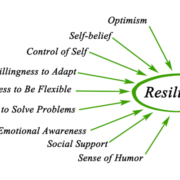5 Pivotal Techniques to Become a More Self-Aware Leader
As a coach, I am often asked what is the most challenging emotional intelligence (EI) core competency people struggle with? In short, it’s self-awareness.
I am a big fan of Ted Lasso, and he is a great example of a coach with self-awareness and a high level of EI. Ted does an amazing job of balancing his authority and empowering others. Leaders are required to be confident, but they don’t have to be at the center of change. Jason Sudeikis, creator, and star of Ted Lasso, stated it so well on Brené Brown’s podcast, “Ted is egoless. He allows for people to be themselves, and reflect what they think he is, but really what they are.”
Having a big ego or low self-esteem really starts with our family of origin and many of us are still wondering if we are good enough because there is a voice in our head that tells us we’re not. An effective coach can ask the right questions to understand another person’s self-awareness and level of self-regard in order to truly influence growth and have buy-in when offering constructive feedback.
Many of us become more self-aware after a very challenging life situation. For me it has been several things – traveling to other countries at a young age, the serious car accident that claimed my father’s life and severely injured my mother, being diagnosed with breast cancer in my 30s, divorcing from my first husband, becoming a stepmom, having my twins, the rollercoaster of running my business, and life as an entrepreneur. My list is long, and I’m sure yours is too. Sometimes, it’s the moments that bring us to our knees and remind us how fragile everything is that force us to be better.
For anyone seeking to be an effective coach or mentor (or more like Ted Lasso), you need to take time to be self-aware and check in with your self-esteem. It is hard to authentically coach or give constructive feedback to someone else if you lack self-awareness or self-regard.
What can you do to start to build on your own self-awareness?
How do you respond in pressure moments? Are you able to understand and recognize your strengths and areas of challenge? Is there a voice in your head that is saying you are not good enough?
To become a self-aware leader takes time, guts, vulnerability, and experiencing failure. One of my favorite quotes from Michael Jordan is about success and failure. He says, “I’ve failed over and over and over again in my life. And, that is why I succeed.”

Here are some things you can do to become a more self-aware leader:
- Test yourself by taking assessments.
Participate in one of our EI-360-Listening Tour Assessments, Six Types of Working Genius, StrengthFinders, Disk, Myers-Brigg, or Color Code. There are several assessments, and each one offers a great opportunity to learn more about yourself. Know your strengths — and areas of challenge — and get to know your peers and team members. Understand what ignites you and what triggers you.
- Listen more and talk less.
Try this listening exercise with your significant other, friend, or peer: Set a timer for five minutes and just listen. You can only respond with positive body language until the 5 minutes is over.
Then set the timer for another five minutes and your significant other, friend, or peer listens to you. They can only respond with positive body language. It will surprise you how much you will learn about each other in 10 minutes.
In our society, we often don’t take time to just listen to understand and really hear someone else. More times than not, we just listen enough to respond.
- Ask for feedback.
Create a Ted Lasso “Complaint Box”, and then follow up on the feedback.
Ask your circle of influence how you are doing and what you can do to improve. Sometimes the best advice comes from others on your team. Find a mentor and be open to constructive feedback without becoming defensive.
- Identify patterns in your own decision-making and behaviors.
Write down why you made a buying decision or why you hired someone or fired them. Did it turn out as you expected?
It’s crucial to understand your own emotional needs and what causes you to be triggered. Moreover, it’s pivotal to understand how you respond during pressure moments and move away from bad habits that sabotage your best performance. It’s high time you identify things that have happened in your past that may not be serving your present or future.
- Learn from your setbacks and failures.
Don’t let a failure define you. Optimists view failure as a short-term setback.
Are you willing to do something different and have you changed your game? Be willing to take a risk or be vulnerable to grow as a leader. Those you lead will see your example of stretching outside of your comfort zone to grow and will emulate it — or at least feel safe enough to explore vulnerability and growth in positive ways. Additionally, you can now look at opportunities to balance intuition with reason and logic when taking risks.
Good self-awareness cannot be thought of as a soft science or new age meditation. It is vital to your leadership growth. As a business coach, I find many leaders are not aware enough to admit they even have a problem or opportunity for growth. Often that awareness does not come to them until they experience a significant setback. Don’t wait – develop your self-awareness right now and see the impact on how emotional intelligence will change the way you work and live — and ultimately succeed.
If you would like to learn more about EI, register for our Leader with Emotional Intelligence Immersive Online Course starting on October 25, 2021. Click here for more information.
Bobi Seredich is the Co-Founder of the Southwest Institute for Emotional Intelligence in Phoenix, Arizona. She can be reached at bobi@swiei.com.











